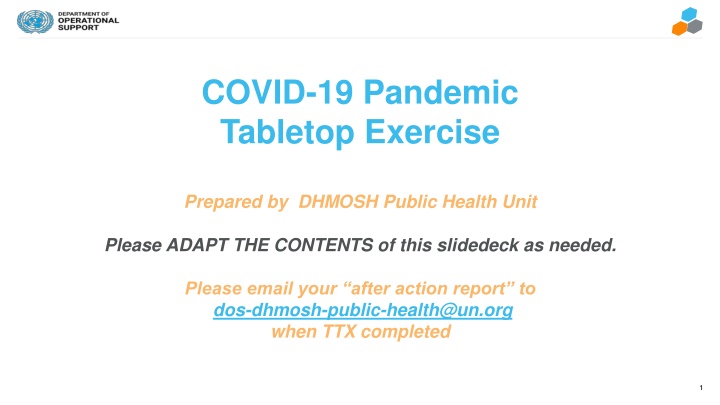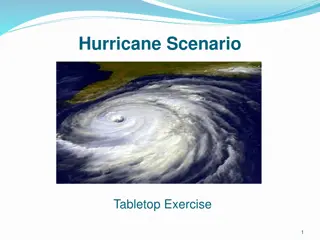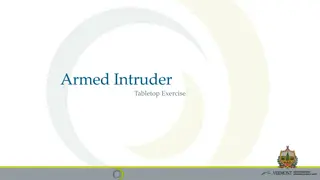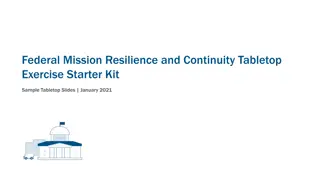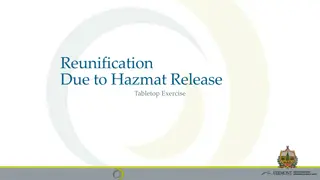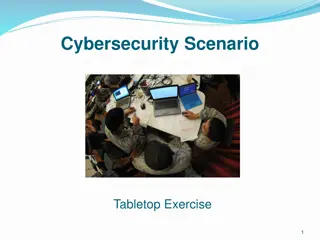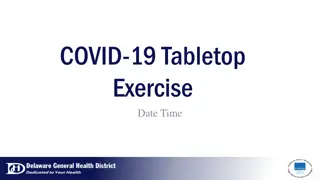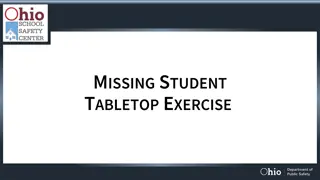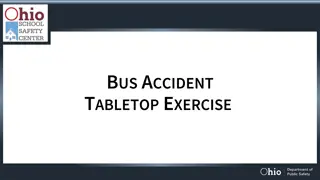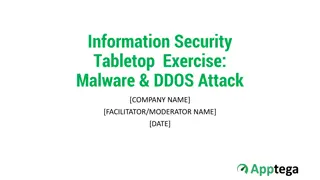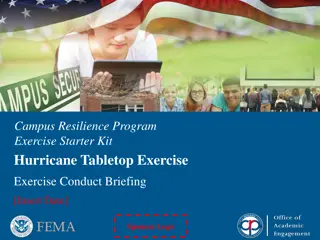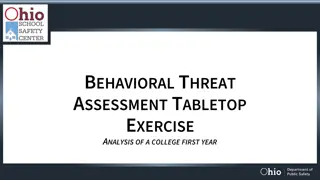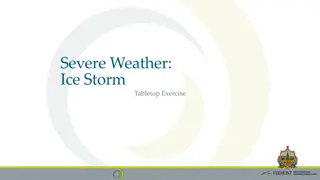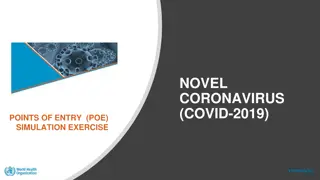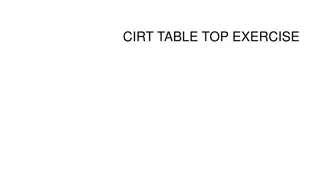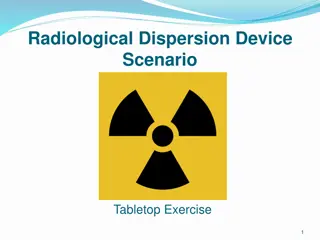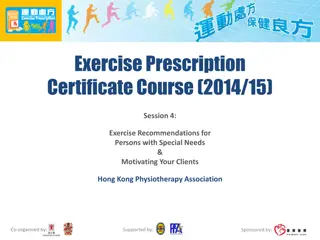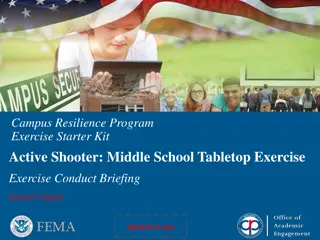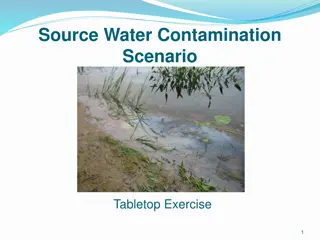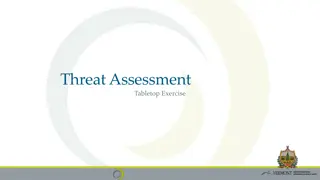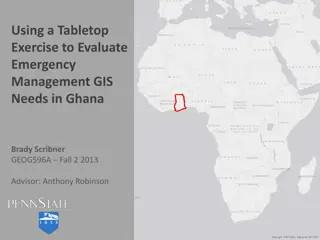COVID-19 Pandemic Tabletop Exercise Overview
The Division of Healthcare Management and Occupational Safety and Health (DHMOSH) Public Health Unit has designed a Tabletop Exercise to assess preparedness in responding to the COVID-19 Pandemic. The exercise aims to enhance awareness, evaluate critical functions for business continuity, discuss key issues, identify strengths and improvement areas. It emphasizes open dialogue and learning from the exercise, as readiness is crucial in public health emergencies like the ongoing Coronavirus Pandemic.
Download Presentation

Please find below an Image/Link to download the presentation.
The content on the website is provided AS IS for your information and personal use only. It may not be sold, licensed, or shared on other websites without obtaining consent from the author.If you encounter any issues during the download, it is possible that the publisher has removed the file from their server.
You are allowed to download the files provided on this website for personal or commercial use, subject to the condition that they are used lawfully. All files are the property of their respective owners.
The content on the website is provided AS IS for your information and personal use only. It may not be sold, licensed, or shared on other websites without obtaining consent from the author.
E N D
Presentation Transcript
COVID-19 Pandemic Tabletop Exercise Prepared by DHMOSH Public Health Unit Please ADAPT THE CONTENTS of this slidedeck as needed. Please email your after action report to dos-dhmosh-public-health@un.org when TTX completed 1
As part of the global response to the ongoing Coronavirus disease (COVID-19) Pandemic, the Division of Healthcare Management and Occupational Safety and Health (DHMOSH) s Public Health Unit has developed the following brief Tabletop exercise to support missions in assessing their preparedness. This Tabletop Exercise should be customized accordingly to your local situation in your country/duty station. The main goal of this exercise is for each duty station/office to assess their preparedness and delegation of responsibilities when responding to the COVID-19 Pandemic. This exercise will help raise awareness amongst participants of the mechanism to respond and manage the Pandemic, help identify any key gaps in preparedness, and ensure ensure business continuity in the face of a high- impact Pandemic. Each duty station/office should conduct this tabletop exercise at least once. Please provide documentation of completion of the exercise and a brief report on the findings of the exercise to dos- dhmosh-public-health@un.org when completed. 2
1. To raise awareness of the mechanism to respond to and manage the COVID-19 Pandemic. 2. To review preparedness for a high impact Pandemic with focus on evaluating the critical functions and ability to ensure business continuity. 3. To provide an opportunity to discuss and explore key issues, using a structured scenario loosely based on real life events. 4. To identify strengths and areas needing improvement with regards to the Pandemic response 3
No organization / duty station is fully prepared for this type of public health emergency. Open and honest dialogue and feedback are encouraged throughout the exercise. Participants should feel free to ask questions to one another and challenge each other s assumptions. No one will be singled out or punished for what they say during the exercise. You should act on the lessons learned here. 4
There have been no major public health emergencies in your duty stations during the past months. Within the past week, the first cases of a severe respiratory illness caused by coronavirus disease 2019 (COVID-19), have been detected in various parts of your host country. All of those infected had recently traveled to affected areas. Symptoms include fever, cough, shortness of breath. Local health authorities are intensifying surveillance and communications activities regarding this new virus, including promoting respiratory etiquette, importance of social distancing, particularly when unwell and good hand hygiene. Messaging remains mixed and rumors are starting to spread. Concerns have been expressed about the level of readiness. There has been a surge in demand for face masks by the local population and UN staff. Within the duty station, a high number of enquiries are received from UN personnel demanding information on the UN system s response to the Pandemic. Many are seeking guidance on work modalities, official and personal travel, both for themselves and for family members 5
What is your mechanism for coordinating actions around this Pandemic situation? Are the roles and responsibilities in response to this Pandemic clear? What is your strategy for sharing information and advice with personnel at this time? How will this be operationalized? What policies / arrangements are or can be put in place to enable alternate work modalities? Which key business functions might be impacted in the short-term (2-3 weeks) and how? What steps can be taken to minimize or manage this? What engagement is required with the rest of the UN and with local host country authorities? 6
It is now end of March. Pandemics of the illness begin to appear through many cities in your host country. Approximately 10% of the population of your host country is estimated to be infected with the virus. No vaccine or effective anti-viral have been developed yet. Face masks are in short supply in some areas, and the public is being encouraged to avoid crowded places. Public transport is operational but user numbers are down. 7
HR is reporting an increased level of absenteeism among UN personnel up to 15% are either ill or caring for family members. Yesterday, a staff member recently returned to your duty station from an affected country, and was isolated in an intensive care unit after displaying symptoms of the virus. This staff member was in the office in recent days, attending inter-agency meetings and working in close contact with colleagues. News of the staff member s hospitalization has spread rapidly, including on social media. 8
1. What steps should/can be taken in response to news of the possible infection of a UN organization staff member? 2. What measures are in place to respond to possible instances of the COVID-19 in the workplace? 3. What considerations are being given to personnel who may be required to travel for official business? 4. What considerations are being given to meetings in the workplace? 5. What are the critical business requirements, what staffing is required to meet these, and how is this determined? What options exist? 6. What psychosocial supports are there available to support UN personnel? 9
It is now mid-April. The number of COVID-19 cases has increased significantly. 20 - 25% of the population has been infected, although the fatality rate remains relatively low at 1-2%. Absenteeism is impacting all sectors, including medical, education, transport, retail and businesses- many of which have seen their supply chains disrupted and their ability to operate impaired. Fear of the virus is growing, and many people are scared to venture out. All public gatherings and events have been cancelled. All persons arriving in the duty station from overseas are being quarantined for 14 days by local health authorities. 10
Approx. 25% of UN personnel are either ill or caring for family members. Due to several cases impacting occupants UN premises, some of the premises have to be closed in coming days. Medical supplies are running low in your UN health facility / host country health facilities. UN AFPs are asking if UN Secretariat can assist in securing a ready supply. One staff member is threatening to sue the UN as a result of his having contracted the virus while travelling on official business. 11
1. What additional measures can be put in place to reassure and ensure safety and wellbeing of personnel? 2. What steps might be taken to ensure that critical functions of your duty station/organization can continue to operate effectively? 3. What support might your mission/office be able to offer other UN AFPs in your duty station? 4. Are there any reputational issues that need to be considered? 5. What are the psychosocial supports that may be necessary at this time? 6. What stockpile considerations are important at this time? What supplies should should be stockpiled? 12
Thank You 13
COVID-19 Tabletop Exercise: Optional Scenario For Duty Stations with UN Health Facility/ies 14
Scenario for Clinical Staff One of the UN personnel who has recently returned from travel to an affected area 5 days ago has called the clinic to inform them that they are now very ill with fever, cough and shortness of breath. They are wondering what to do next? They sound stable otherwise. You thank them for calling the clinic in advance so you can prepare for their arrival. 15
1. What steps should we ask the sick UN personnel to take at this stage? 2. If the patient arrives to the clinic what immediate measures should be started? 3. What question should be asked of the patient to see if they are at risk? 4. What are the next steps for the clinical staff regarding management of the patient at this time? 5. What are next public health steps? 6. What would you do if the patient becomes sicker and have more severe symptoms? 7. If the local health facilities are not able to accept the patient, what options do you have? 16
Thank You 17
